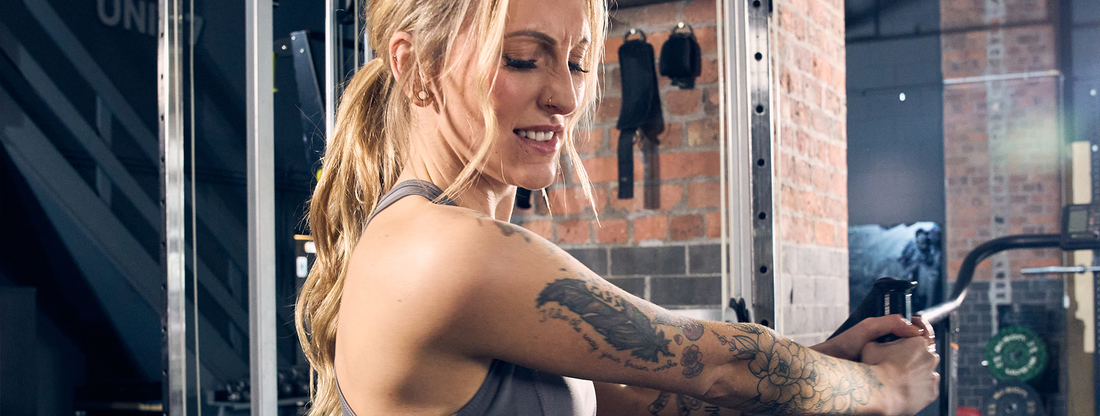
Creatine or Protein: Which Is Better?
August 2024When it comes to fitness and bodybuilding, the creatine versus protein debate is always a hot topic. Both supplements have various benefits, but how do you know which is right for you? Whether you’re aiming to gain weight, build muscle, or shed fat, it’s essential to understand the core differences and similarities between creatine and protein. This guide will explain each supplement’s unique and shared benefits and whether combining them can supercharge your fitness journey.
What is creatine?
Creatine is a naturally occurring compound in your muscles, made from three amino acids: arginine, glycine, and methionine. Simply put, creatine is like a quick energy boost for your muscles. That's why many athletes and fitness enthusiasts turn to creatine supplements to enhance their performance, build muscle, and recover faster. Curious to learn more? Check out our blog, The Ultimate Guide to Creatine.
What is protein?
Protein is a macronutrient crucial for building and repairing tissues, making enzymes and hormones, and supporting overall body functions. It’s made up of amino acids, which are the building blocks of muscle. Whey protein, a popular form of protein supplement, is derived from milk and is known for its rapid absorption and high amino acid content. Protein supplements are commonly used to support muscle growth, repair, and recovery, making them a staple in many athletes' diets.
What are the similarities between creatine and protein?
While creatine and protein serve different primary functions, they share several benefits that can support your fitness goals.
Muscle gain
If building muscle is your goal, creatine and protein should be your go-to supplements. Creatine ramps up the energy available for your muscles, helping you lift heavier and squeeze out those extra reps. This means more muscle activation and growth. Meanwhile, protein is the building block your muscles need to repair and grow after those tough workouts.1 Together, they can significantly boost your muscle-building efforts.
Improve performance
Creatine or protein can play a significant role in improving performance but in different ways. Creatine gives you that extra burst of energy for high-intensity activities, perfect for those explosive movements.2 Protein, on the other hand, helps with recovery, reducing muscle soreness and allowing you to train harder and more frequently.
Cognitive benefits
Interestingly, both creatine and protein also offer cognitive benefits. Creatine has been linked to better brain function and mental clarity, especially during tasks that need sharp focus and quick thinking.3 Protein, especially certain amino acids like tryptophan, can boost your mood and cognitive function by aiding in neurotransmitter production. So, while building muscle, you also boost your brain.
What are the differences between creatine and protein?
While there are similarities, the differences between creatine and protein powder are just as important to understand.
Primary function
Creatine primarily enhances energy production in muscles, making it ideal for high-intensity, short-duration activities like weightlifting and sprinting. Protein, however, is essential for muscle repair and growth, supporting overall recovery and long-term muscle development.
Timing and dosage
When and how much you take also varies between the two. Creatine often starts with a ‘loading phase’ where you take about 20 grams per day for 5-7 days to saturate your muscles, followed by a ‘maintenance phase’ of 3-5 grams per day. You can take creatine before or after your workouts. Protein, especially whey, is typically consumed after your workout (20-30 grams) to jumpstart muscle recovery. However, it’s also beneficial throughout the day to meet your protein needs.4
Source
Creatine is something your body can make on its own, and it’s also available as a direct supplement. Protein, especially whey protein, comes from dairy and provides a rich mix of amino acids. This difference in origin highlights their unique roles: creatine for energy production and protein for muscle repair and growth.
While both creatine and protein are vital, understanding their distinct roles can help you use them more effectively to reach your fitness goals.
Should you take creatine and protein together?
Combining creatine and protein can provide a synergistic effect that maximises your workout results. Creatine boosts your energy levels, allowing for more intense workouts, while protein aids in muscle repair and growth post-exercise. Mixing creatine with a protein shake is a convenient way to ensure you get both benefits simultaneously.
Get started with creatine and protein
Whether you choose to take creatine, protein, or both, you are on a solid track to improve your workout performance. If you're ready to enhance your performance, increase muscle mass, and improve recovery, explore our range of high-quality creatine and protein products.
Do you want to add size and strength? Check out our All-in-One Muscle Fuel Anabolic.
Are you looking to add or maintain lean muscle? Check out our Blue Lab 100% Whey Protein Powder and cycle with our Micronised Pure Creatine Powder.
Visit our blog for more insights and tips on maximising your fitness potential with creatine and protein.
FAQs
Is it better to take creatine or protein after a workout?
Both are beneficial post-workout, but they serve different purposes. Creatine can help replenish ATP stores depleted during intense exercise, while protein aids in muscle recovery and growth. For optimal results, consider taking both after your workout. Many fitness experts suggest having whey protein within 30-45 minutes after your workout to kickstart the recovery process.
Is whey protein or creatine better for beginners?
For beginners, the choice between whey protein or creatine depends on your specific goals. Start with whey protein if your primary aim is to build muscle mass and support overall recovery. If you want to enhance performance and increase strength, consider adding creatine. Using both can provide comprehensive support for your fitness journey.
References
- Whey Protein Supplementation Enhances Whole Body Protein Metabolism and Performance Recovery after Resistance Exercise
- Creatine Supplementation Enhances Immunological Function of Neutrophils by Increasing Cellular Adenosine Triphosphate
- Effects of Creatine on Mental Fatigue and Cerebral Hemoglobin Oxygenation
- How Much Protein Can the Body Use in a Single Meal for Muscle-Building?


